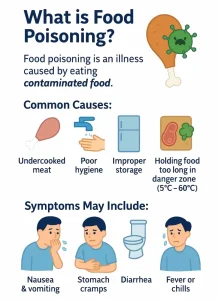Overview
Diagnosis
A healthcare professional diagnoses food poisoning — also known as foodborne illness — through a physical examination and a review of symptoms and recent activities that could explain vomiting, diarrhea, or other digestive issues.
Your healthcare provider may ask about:
-
The type and timing of your symptoms
-
Foods or drinks you’ve recently consumed
-
Whether others who ate the same food are also sick
-
Any new medications you’ve started
-
Recent travel or exposure to new environments
During the physical exam, the healthcare professional checks for signs of dehydration and rules out other potential causes of illness.
Tests may include:
-
Stool sample tests: To identify bacteria, viruses, parasites, or toxins causing the infection.
-
Blood tests: To confirm the cause, rule out other conditions, or detect complications.
In individual cases, it can be difficult to pinpoint the exact food responsible, since symptoms may appear hours or even days after eating. In larger outbreaks, public health officials may identify a common contaminated food source among all affected individuals.
Treatment
Treatment for food poisoning depends on the cause and severity of symptoms. Most people recover without needing prescription medications.
Common treatment approaches include:
-
Fluid replacement:
Rehydration is the most important part of treatment. Replacing lost fluids and electrolytes — such as sodium, potassium, and calcium — helps maintain balance in the body. In cases of severe dehydration, hospital treatment with intravenous (IV) fluids may be necessary. -
Antibiotics:
These are prescribed when the infection is caused by specific bacteria and symptoms are severe. Antibiotics are generally reserved for people at higher risk of complications, such as infants, older adults, or those with weakened immune systems. -
Antiparasitic medicines:
When food poisoning is caused by parasites, antiparasitic drugs may be prescribed to eliminate the infection. -
Probiotics:
Probiotics can help restore healthy gut bacteria and speed recovery from diarrhea or gastrointestinal upset. -
Over-the-counter symptom relief:
Adults without fever or bloody stools may use medicines such as loperamide (Imodium A-D) for diarrhea or bismuth subsalicylate (Pepto-Bismol, Kaopectate) for stomach discomfort. These medicines are not recommended for children.
Most cases of food poisoning resolve within a few days with rest, hydration, and careful monitoring of symptoms. Seek medical attention if dehydration becomes severe, symptoms persist, or signs of a serious infection appear.
Advertisement

